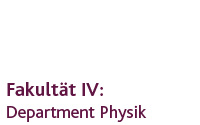Curriculum
In a nutshell
 The MSc Program in Physics covers two years:
The MSc Program in Physics covers two years:
- 1st year: Students take several courses which ensure a solid background in general physics and prepare them for actual research in their chosen specializations.
- 2nd year: Students carry out research and write their master thesis as a member of one of the research groups of the physics department.
Admission is possible for winter semester (lectures starting in October) and summer semester (lectures starting in April). The program does not require knowledge of the German language.
The following text gives a short overview of the curriculum; detailed information can be found in the Handbook of Modules.
Structure and content
In the first year, students can choose lectures and courses according to their specialization. In Siegen, we mainly offer courses focused around the following topics:
- Experimental solid state physics
- Quantum information theory and foundations of quantum mechanics
- Experimental quantum optics and nano-optics
- Theoretical particle physics
- Experimental particle and astroparticle physics
 These themes correspond to the topics of our research groups. In addition to lectures, master students have to take a lab course and a seminar.
These themes correspond to the topics of our research groups. In addition to lectures, master students have to take a lab course and a seminar.
Between the first and second year, students have to take an oral exam (30-45 min), covering topics from several lectures of their chosen specialization area. The second year is then devoted to the MSc thesis, which is prepared in one of the research groups. The aim of the thesis is to deliver a contribution to current research in theoretical or experimental physics. The excellent student-to-staff ratio at the department implies a direct supervision and it occurs regularly that results from MSc theses are published in international scientific journals.
In general, a MSc degree is a precondition to enter a doctoral program in Germany. The PhD research is performed in one of the research groups and prospective PhD students have to find a professor who is willing to supervise their work. Typically, PhD theses last 3-4 years and PhD students get financial support.
Curriculum
The table displays an example of a curriculum for a specialization in experimental solid state physics.
| First semester | Second semester | Third semester | Fourth semester |
|---|---|---|---|
| Exp. Solid State L4, T2, 9CP | Exp. Quantum Optics L4, T2, 9CP | Oral exam in Exp. Solid State | |
| X-ray Physics L2, T2, 6CP | Nano-Structures L2, T2, 9CP | ||
| Nano Optics L2, T2, 6CP | Condensed Matter L4, T2, 9CP | ||
| Lab Course P4, 9CP | Seminar S2, 6CP | MSc thesis (30 CP) | MSc thesis (30 CP) |
Abbreviations: L4: lecture (4 hours/week), L2: lecture (2 hours/week), T2: tutorial (2 hours/week), P4: lab course (4 hours/week), S2: seminar (2 hours/week), CP: credit points.
Possible specialization areas and study plans
 As mentioned, several specializations are possible. The following list gives some examples and the corresponding courses.
As mentioned, several specializations are possible. The following list gives some examples and the corresponding courses.
Specialization: Experimental Quantum Optics
- First year courses: Experimental Quantum Optics, Laser Spectroscopy, Data Analysis, Quantum Information Theory, Nano-Optics & Lab Course
- Second year: Oral exam in experimental quantum optics, MSc thesis
Specialization: Experimental Particle Physics
- First year courses: Experimental Particle Physics, Theoretical Particles Physics I, Physics at the LHC, Detector Physics, Data Analysis, Astroparticle Physics & Lab Course
- Second year: Oral exam in experimental particle physics, MSc thesis
Specialization: Theoretical Quantum Optics
- First year courses: Quantum Theory of Light, Laser Spectroscopy, Condensed Matter Theory, Quantum Information Theory, Experimental Quantum Optics, Cosmology, Mathematical Foundations of Quantum Mechanics & Lab Course
- Second year: Oral exam in theoretical quantum optics, MSc thesis
Specialization: Theoretical Particle Physics
- First year courses: Theoretical Particle Physics II, Physics of the Higgs, Extensions of the Standard Model, Collider Physics, Quantum Information Theory, Experimental Particle Physics & Lab Course
- Second year: Oral exam in theoretical particle physics, MSc thesis
Specialization: Mathematical Physics
- First year courses: Theoretical Particle Physics II, Quantum Theory of Light, Mathematical Foundations of Quantum Mechanics, Functional Analysis I, Quantum Information Theory, Functional Analysis II, Experimental Quantum Physics & Lab Course
- Second year: Oral exam in theoretical physics, MSc thesis
Specialization: Solid State Physics
- First year courses: Experimental Solid State Physics, Experimental Quantum Optics, Theoretical Solid State Physics, X-ray Tomography, Solid State Physics of Nanostructures, Physics of Biological and Soft Matter, Nano-optics, Nano-biophotonics & Lab Course
- Second year: Oral exam in solid state physics, MSc thesis
For questions concerning the possible curricula you can always contact our advisors.

